






The Familyby Jeff Sharlet Connecting the Wealthy Elite with the Religious Right Reviewed by Theresa Welsh The subtitle of this book tell us there is a "secret fundamentalism at the heart of American power" and that was intriguing enough for me to begin reading. The author takes us on a whirlwind tour of right-wing religion, variously called Evangelical or Fundamentalist. He introduces us to a powerful man I never heard of named Doug Coe, who directs an international confederation of people in high positions. Was I surprised by what I read in this book? Yes! God Cares More About the RichI have always wondered how the religious right, who seem to own the Republican Party, justify their beliefs and actions. The author wrote this book before the 2008 election of Barack Obama, about whom he says not a word. But he does give us a picture of Coe's following (which has no official organization, but which the author calls "The Family") whose public face is the annual Washington Prayer Breakfast. The Family's roots go back to early Twentieth Century when an immigrant named Abram Vereide decided God cared most about the elite, who were put in their high positions through God's favor. Religion, he thought, should be about these elite people, the chosen. He began to work with the rich and politically powerful, staying in the background, but organizing these key people into "prayer cells," modeled on Communist and terrorist methods. Doug Coe became his successor and today Coe, who is getting old, is turning over leadership to a guy named Dick Foth. I am tempted to think this is just another conspiracy theory about a shadowy group working to establish a New World Order, but that doesn't really fit. More than the political implications, I found the religious concepts pretty amazing, and not in a good way. Their Jesus is a person I do not recognize from anything I was taught in 12 years of Catholic school, or in a lifetime of searching for "truth." Their Jesus does not care about how we respond to the physical needs of others (like feeding the hungry, sheltering the homeless, or providing treatment for the sick and injured). Instead, he bestows power on certain people (you can tell who they are because they are wealthy and in positions of power) and the task of everyone else is to be OBEDIENT to these people. I capitalize the word "obedient" because this word and its verb "OBEY" are offensive to me. I would love to remove these words from our language. Distaste of DisobedienceGrowing up Catholic, I remember being taught that the primary sin to confess in confession was "disobedience." This free-floating concept, that ordinary, non-powerful people exist to "obey" others is a means to rob people of their ability to think and act for themselves. Perhaps it is okay for little children to obey parents when they are told not to play in the streets or touch the hot stove, but obedience for adults, IMHO, is just a form of slavery. Immersion in a Closed Belief SystemCatholics, like Evangelical Protestants, think obedience is great, but they lack the passion and participation of Evangelicals. The author gives us a picture of people enveloping themselves in their belief system, starting as youths who might live together in a place like Ivanwald, a house the author stayed in for a while, participating with the other young men who lived there. Leaders and teachers from the Family would visit and impart nuggets of wisdom. The idea is to work with tomorrow's leaders, to inculcate them with the idea of a God-chosen elite. The Family always claims to be directed by God (or by Jesus - they don't seem to be big on God the Father or God the Holy Spirit). This provides a justification for the actions of political elites. I wondered though if the author wasn't wandering around the world of right-wing religion and tying it together more than it really does connect. He takes us to Colorado Springs where Pastor Ted Haggard built an enormous organization based on "cells" of believers, but organized around Pastor Ted and a complex of elaborate and expensive buildings in the mountains. Ted Haggard, as you may know, went through a homosexual scandal that failed to derail his ministry. His followers want an impressive physical church and elaborately produced services that rival rock concerts, while a huge audiences is moved by it all. Others attracted to evangelicalism like to meet in homes and home-school their kids, keeping it all low-key. They live in nice neighborhoods in far exurbia, away from the bad influences of urban life. But maybe it does all tie together by its willingness to accept lots of flaws in leaders. Not just your ordinary adulterers, but more massive crimes. Doug Coe's followers were fine with murderous dictators like Suharto in Indonesia who slaughtered at least (probably a lot more than) half a million of his own people. Forgiveness comes easy for this crowd, who don't believe in karma. Just sign on to Jesus and your past is forgotten. No atonement needed, no payback in a future lifetime. Admiring "Strong" Leaders — Like Hitler!I like the author's attempt to trace the origins of American fundamentalism and references to other scholarly works on belief systems, both political and religious, that might shed some conceptual light on the subject, but, as I got to the end of the book, I was still largely puzzled. How can you believe in a God who speaks to you personally, but also demands obedience to earthly leaders? Why do we need any guidance from God if our mission is to do the bidding of earthly leaders? How can those who are not members of the (in recent parlance, the 1%) elite, just give up their right to self-determination? The author frequently cites The Family's admiration for the tactics of people like Hitler and Stalin. Were they chosen by God too? What kind of a religion points to evil people as models? Perhaps one that believes in totalitarianism, but tries to reframe the lives of the founding fathers as Christian fundamentalists who, after all, wanted God in charge. The book is a fascinating read, but I still don't get it. How can fundamentalism of this stripe be so appealing to so many? It left me feeling appalled and afraid for the future of my country and the world. Click below to go to amazon.com page for this book: |
|
 |
 |